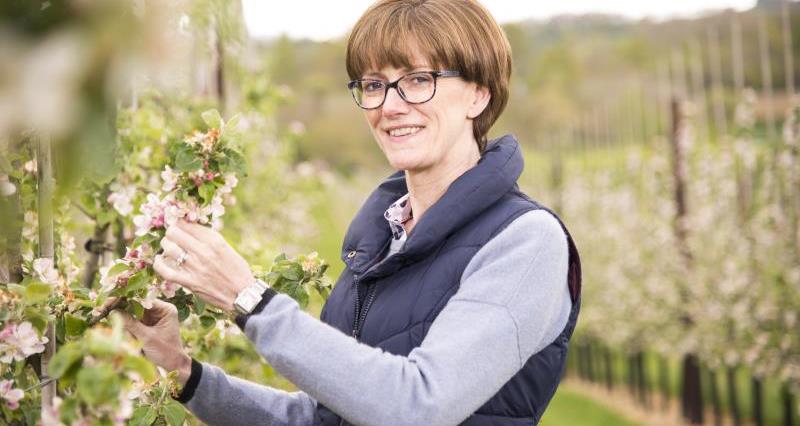NFU Horticulture and Potatoes board chairman, Ali Capper, considers the impact that unexpected external influences have on businesses; such as weather extremes, the B&Q neonicotinoid ban and surprise GM revelations.
But after one of the driest winters in 20 years, growers are currently having to contend with the prospect of drought conditions in the coming months. At the same time, many are also having to handle the consequences of irreparable frost damage which has, in some instances been shown to have wiped out up to 85% of the crop, particularly for seasonally vulnerable trees and plants. For many, this is going to be a tough year.
However, this is the day-to-day reality for British growers. I remember the localised hail damage that hit our orchard a couple of years ago. Our apples were bruised to the point of destruction, whereas close neighbours managed to escape damage. The unpredictability of our weather has long been something with which British growers have a love-hate relationship. Sometimes it blesses us with a bounteous harvest. Other times it likes to show us who’s really boss.
We have a hard enough time in optimal conditions. But when external factors interfere with production; this only serves to add to the financial burden facing businesses these days.
Case in point, B&Q recently announced that, from February 2018, it will no longer sell flowering plants grown using neonicotinoids because of concerns over their effect on bees. This move will ban its growers from using products that European legislation allows them to use.
While it might appeal to popularist convention, the decision is not driven by the scientific evidence.
The irony was that in the same week, the world-leading agricultural research station at Rothamsted questioned the evidence behind neonicotinoid bans and re-iterated that it still does not provide a clear steer for policy-makers.
We would all like a silver bullet for improving bee health, but the reality is pollinators are up against multiple challenges, not least pests and diseases, loss of habitat, changing climate, invasive species and non-farming related chemicals in the environment. Without good evidence we risk making changes based on popular opinion that don’t actually help bees, but do have costs for the supply chain and unintended consequences for the environment.
Another unplanned development last week was that the Animal and Plant Health Agency (APHA) emailed importers and producers of petunia plants and seeds in England and Wales, instructing that certain varieties of petunias must be removed from the market after suspicions that they may contain genetically modified material.
This news follows an initial report that GM petunias had been found on the market in Finland, supplied as young plants from Germany, Denmark and the Netherlands. Whilst there is no evidence to suggest GM plants have been introduced deliberately rather than inadvertently, EU authorities are working to locate the source of the issue with a view to preventing further occurrences.
This unexpected revelation will, of course, impact growers greatly with loss of sales and loss of royalties from any varieties bred from these petunias. The NFU is requesting any affected growers to phone Call First so that we can determine the best course of action to assist them.
These are just examples of issues that have risen in the last few weeks for growers to contend with in this highly competitive and tight-margin industry.
Whilst we have to be hardened to these unpredictable revelations, it doesn’t make it any easier to be at the receiving end. This is why it’s important to be part of an association like the NFU. They tackle these issues to try and reduce the burden on grower members, such as last month’s success in lobbying for agricultural business rate exemptions to continue for nurserygrounds.
Now if only they could make it rain…. (but not too much!)
